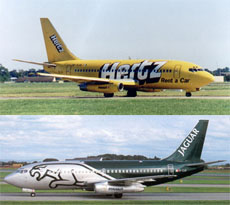 |
Airline Zen : Less is More |
||||
|
Which is the more profitable airline? Imagine two different airlines - one selling roundtrip tickets for $100, the other selling tickets to the same destinations on similar 737s for $30. Which is likely to be the more profitable airline? If you guessed the $100 carrier (ie BA) you're very wrong. If you guessed the $30 carrier (Ryanair) then you correctly picked the airline that succeeds at doing the opposite to what conventional wisdom dictates.
Ryanair will make money any way it can, including using its planes as flying billboards. If it means you get to fly for a lower fare, where's the harm in that!
If you'd
like to receive David's free weekly newsletter (Privacy Policy) enter your email address and click :
[serverinclude/googleads/GA-160600-rhs-belowtop.htm]
|
In 1985, a tiny new airline started operation, flying between the town of Waterford in the Southeast of Ireland and London's Gatwick airport, operating a single 15 seater turbo-prop commuter airline. It carried 5000 people in its first year. and had a staff of 57. Flash forward. Earlier this week, that same company, Ryanair, took prime position as the airline with the highest capitalisation (ie stock market value) in all of Europe. It is one and a half times as valuable as BA and - at least for a while - exceeds the market value of the previously highest valued airline - Lufthansa as well. This is an extraordinary growth and success for any company, all the more so because Ryanair is relatively debt free and strongly profitable. And - amazingly - it has generated its profits not by gouging its passengers with ever higher and higher fares, but by consistently dropping its fares, lower and lower and lower. When it first started flying between London and Dublin, the normal airfare was £209. Nowadays, Ryanair discounts it down to as low as £9 (about US$13). Today they are selling airfares between London and Venice (or Glasgow) for as low as £8 roundtrip. In October they offered a million seats for sale at £20 ($29) roundtrip, and so British Airways responded with its own seat sale, but offering roundtrips for £70 ($101). Am I the only one to think that a $100 fare is not much of a response to a $30 fare? The incredible thing about Ryanair is that it makes a profit, even at these low fares. For the full year ended 31 March 2001, it recorded a profit of $116 million, an increase of 44% over the previous year. For the first half of the 2002 year (through 30 Sep, ie, including 'black September') it made a profit of $98 million, a 39% increase on the first six months of the previous fiscal year. You might think it impossible to get a lower fare than $30 for a roundtrip flight for destinations up to 1000 miles away (eg New York to Chicago, or Seattle to Los Angeles), but keep reading. Ryanair is now proposing the ultimate in discount tickets. Free. (Isn't that everyone's favorite four letter word beginning with the letter 'f'!). CEO Michael O'Leary said he expects to offer free seats on some off-peak flights. The Irish airline would make money from services such as live pay-per-view television, hotel bookings, car hire, shopping and internet gambling. Within three years, he expects that 10% of passengers will get free tickets on off-peak flights. "There is absolutely no reason why we could not eliminate fares altogether on off peak flights," said O'Leary. "If we can increase the average spend per passenger enough, we could afford to cut fares to zero." At the moment, the average spending on ancillary services is about £4 a passenger, and the introduction of additional services such as onboard satellite television is expected to increase this significantly to the point where these extra revenues are higher than their rock bottom airfares. Lessons from Ryanair for our Market How is it that Ryanair seems able to make a profit selling fares at $30 when British Airways reports losses while selling the same fares for $101? And perhaps the next question should be - why aren't the traditional European carriers successfully copying Ryanair instead of quietly going broke in the background? There are three distinctive things about Ryanair. The first is that nothing is included - everything is extra. If you check a bag, you pay more. If you check two bags, you pay even more again. And so on. But - this is fair. It means that users pay for what they need and don't pay for anything they don't need, and the fact that Ryanair charge for all the related but optional parts of a flight is a large part of the reason why they can drop the fixed part of a ticket price so low. The second distinctive thing is that they have partnered with rental car companies and hotels so that they earn commissions on selling these products to their passengers. By viewing each passenger as an opportunity to make money in more ways than just transporting them somewhere by plane, they again reduce the amount of money they need to charge for the air ticket by itself. The third distinctive thing about Ryanair is that it fills its planes as full as it can with people, no matter what price the ticket might be. In the US, airlines have chosen to limit how low they will set bargain prices on the seats that they just know they'll never otherwise sell, but at Ryanair, they don't seem to care what price they sell the tickets for, just so long as they keep selling, selling, selling. Of course, not every seat on every flight is sold cheaply, but if they don't think they'll sell a seat for a higher fare, they'll happily sell it for a lower fare. The reality is that the extra cost of flying an extra person is only a few dollars - anytime an airline sells a ticket for more than this, they're starting to make a profit on the ticket. I can understand how traditional 'full service' (in their dreams, perhaps) US carriers might be hesitant to adopt the first of these three strategies, but why can't they adopt number two, and, for sure, give us all a break, and adopt number three! A Failing Grade for the Internet Ryanair are currently selling airfares between London and Venice for $11.50 roundtrip. I went to several of the leading travel websites and searched for the lowest fare. Travelocity's lowest fare was $147 on Alitalia or Lufthansa and $163 on BA. Orbitz quoted $195 on BA but said that they couldn't book it. Expedia quoted $195.49 on BA. None of them mentioned Ryanair. Check your own favorite websites and see if they'll tell you about the Ryanair fare. Delta Tries Free Tickets in the US Delta is taking a leaf out of Ryanair's book by giving away 10,000 tickets to New York as part of a 'Delta Loves New York' promotion. Many tickets include free accommodation packages as well. There are several different ways you can enter to win - go to their website for more details. Let's hope they extend this promotion to their entire network, and a hearty thanks for the first 10,000! Will Your Favorite Airline Go Broke? The Forbes website has a fascinating article reviewing the major US carriers and assessing the likelihood of each carrier going broke. Southwest is rated least likely to fail, at the other end of the spectrum, America West is given a 90% likelihood of failing and US Airways 80%. This Week's Stupidest Airfare Sale You can't blame the US carriers for trying (or can you?). On Wednesday I received two emails promoting airfare specials. One was from Travelocity, and it was intelligent enough to tell me only about fares applicable to Seattle (where I live). The other was from the airline megasite Orbitz and none of the 17 featured specials involved an airport within 500+ miles of Seattle. The really stupid part was the routes that were on sale. The lowest fare - $98 - applied to travel between Orlando and Tampa. You can drive the direct I4 freeway between these adjacent cities in less time than it would take you to check in for the flight! Update - November 2002 : Continued Success In the twelve months since this column was first written, the low fare model espoused by RyanAir and its competitors such as easyJet continues to be amazingly successful. Fares have continued to drop to the situation where there are now occasional special promotions that offer as many as 50,000 tickets completely free (other than for the continually increasing cost of government taxes and other fees!). easyJet is the largest of the low fare carriers in Europe, and on 26 November it announced its full year profit - increased up to £71.6 million ($112 million) before tax, compared to £40 million the previous year. During the year, average fares declined by 4% and passenger numbers increased by 60%. Tell David your opinion. Send him an Email - [email protected]
Originally
written 16 Nov 2001, last update
30 May 2021 |
||||
